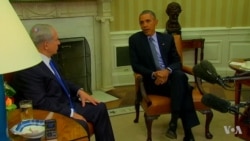U.S. President Barack Obama and Israeli Prime Minister Benjamin Netanyahu met in Washington Monday, trying to find ways to cope with what the U.S. leader described as a deteriorating security environment in the Middle East.
The two leaders have often had a fractious relationship and their meeting was the first in more than a year. The White House talks occurred in the aftermath of Netanyahu's vocal opposition to the Iran nuclear deal negotiated in July by the United States and five other world powers, but Obama called that a "narrow issue" of disagreement.
Both leaders warmly embraced the long-standing military and security alliance between their countries, with Obama calling "the security of Israel one of my top foreign policy objectives."
WATCH: video on Obama, Netanyahu meeting
Obama said he and Netanyahu would discuss "how we can blunt the activities" of the Islamic State, Hezbollah and other insurgent groups that "carry out terrorist activities."
While he acknowledged Israel's opposition to the Iran deal that restrains Tehran's nuclear program but also lifts economic sanctions against it, Obama said the two leaders would find common ground in halting "destabilizing activities that Iran may be undertaking."
Obama administration officials said last week that the U.S. president no longer believes that agreement on creation of a Palestinian state can be achieved before he leaves office in early 2017. Netanyahu said, "We have not given up on our hopes for peace, two states for two people," with a demilitarized Palestinian state and recognition of the Jewish state's right to exist.
"We genuinely want to achieve peace" with other Middle East countries if they do as well, Netanyahu said.
Netanyahu was among the most vocal critics of the Iran pact, saying it would not slow Tehran's work toward a nuclear weapon and would put Israel in danger. He highlighted his concerns in an address to the Republican-controlled U.S. Congress in March during a trip in which he did not meet with Obama.
Hours before he left Israel, Netanyahu said the talks would focus on "strengthening the security" of Israel. He said Israel's security is something the U.S. has always been committed to, with the goal of maintaining Israel's comparative military advantage in the face of a changing Middle East.
Israel already receives more than $3 billion a year in U.S. military aid, and officials say Netanyahu hopes to get that raised to $4 billion to $5 billion annually. The current 10-year arrangement expires in 2017.
"I believe that this meeting is important in order to clarify the continuation of American aid to Israel in the coming decade," Netanyahu said. Obama said they would talk about a new military assistance agreement, although U.S. officials say a new defense deal will not be finalized at the meeting.
"We do believe it's very important," said Ben Rhodes, Obama's deputy national security adviser, "that in an uncertain security environment, we are signaling our long-term commitment to Israel and its security and are designing a package that is tailored to the threats and challenges that Israel will be facing over the course of the next decade."
Obama and Netanyahu also were expected to discuss the fresh wave of Israeli-Palestinian violence that began two months ago at a Jerusalem holy site and spread across Israel and into the West Bank and Gaza Strip.
U.S. officials said Obama and Netanyahu would discuss steps to prevent further confrontation between the Mideast parties in the absence of a peace agreement.
The visit also comes amid a dispute over the Israeli prime minister’s new spokesman, Ran Baratz. In a posting on Facebook, Baratz said Obama's response to Netanyahu's last visit "is what modern anti-Semitism looks like in Western liberal countries."
He also said U.S. Secretary of State John Kerry has the mental capacity of a 12-year-old.
The U.S. State Department called the comments “troubling and offensive,” and said that Netanyahu has promised to “review” the appointment.
In a new Facebook post, Baratz apologized for the “hurtful remarks” he posted and said he was sorry he had not informed Netanyahu in advance about them.
Rhodes said he wouldn't expect the issue to come up during the meeting between Obama and Netanyahu.







